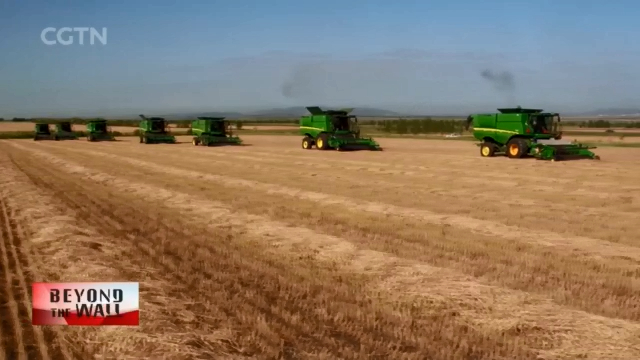
16:09, 10-Sep-2018
Rural Vitalization: China's countryside strategy is key for future reforms
Updated
15:31, 13-Sep-2018
05:26

In our first episode of 'Beyond the Wall', we focus on breakthroughs in thinking that are transforming China and leading its future. Reform started from the countryside with land ownership experiments. Forty years on, land is still one of the most sensitive and crucial parts of reforms. CGTN correspondent Han Bin goes to North China's Inner Mongolia Autonomous Region. He finds out how a breakthrough can be made in achieving the development blueprint and in food production.
This could be a dream for many Chinese. Li Jie farms 30 hectares of land. That's over 100 times more than average. But the scarcity of arable land has kept most farmers poor.
LI JIE, FARMER QIANJIN VILLAGE, INNER MONGOLIA "Land is the whole life support of farmers. Without it, nothing will ever be possible. Many have left the village to earn money, and they have contracted their land to us."
Despite huge improvements, farming in China remains inefficient.
LI YANHAI, FARMER QIANJIN VILLAGE, INNER MONGOLIA "Some of the big advanced foreign farms don't need too much manual labor. Their living conditions are very good, not much different from the cities. For a long time, land has limited farmers' minds. They only think about how to grow crops. But yields won't increase any more. The next step we need to consider is how to increase land's added value and raise farmers' income."
A big fix is needed to suit the market economy. The government's new policy is to vitalize the countryside.
LI YANHAI, FARMER QIANJIN VILLAGE, INNER MONGOLIA "This policy is very attractive. The rural areas are gradually transforming into urban areas. Our village is also trying new ways to reform, like turning villagers into shareholders. We are trying to grow cash crops to transform traditional agriculture."
The government understands if issues of agriculture and farmers are not handled properly, overall undertakings could suffer. Though the direction is now clear, for many, it takes both wisdom and courage to push the envelope.
HAN XUDONG, GEN. MANAGER SHANGKULI FARMLAND, INNER MONGOLIA "Shangkuli has always been a major grain producing farm in China. 70% of the land is planted 50-50 with wheat and rapeseed. This high-protein wheat commands a good price. We plant it to follow the market rule. In food production, we've always been consistent in directions: cost control, reduce fertilizers and pesticides, and use protective methods in tillage. This combine harvester is very efficient. It does around three hectares an hour. It used to take four combines to harvest this piece of land, but now we need only one. Another key point is it does a great job of spreading the straw to cover the land evenly. This is crucial for keeping the soil moist."
40 years after reform, the countryside still lags far behind. And rural development is a top priority.
HAN BIN SHANGKULI FARMLAND "China must feed 20 percent of the world's population. That makes agriculture key to stability, and the well-being of its people. The government backs large-scale mechanized farming to raise production and income. But to vitalize the vast countryside is a long-term challenge."
HAN XUDONG, GEN. MANAGER SHANGKULI FARMLAND, INNER MONGOLIA "The Rural Vitalization Strategy gives us a direction. We need to manage our farm as an enterprise, to spur workers' enthusiasm, to introduce modern enterprise management, and create the highest value with the fewest people. You can go and feel it. This combine is good for harvesting small crops, like wheat and rapeseed. We are now shifting from traditional to modern agriculture. Every vehicle has automatic navigation. We want to get the greatest value from land, while at the same time to maintaining the ecological balance. Our farm aims to become an international major grain supplier, and the target is to produce green, organic and healthy food. I think China's reform measures should be further strengthened."
LI YANHAI, FARMER QIANJIN VILLAGE, INNER MONGOLIA "We hope to strengthen rural land transfer to create more family farms and cooperatives."
LI JIE, FARMER QIANJIN VILlAGE, INNER MONGOLIA "With bigger contracted plots, we can use mechanized farming."
HAN XUDONG, GEN. MANAGER SHANGKULI FARMLAND, INNER MONGOLIA "We also need to contract more land from farmers and society for production. If rural land can be further transferred, in a system linked to the urban real estate market, we can then turn the rural idle resources into real capital."
LI YANHAI, FARMER QIANJIN VILLAGE, INNER MONGOLIA "I hope that in the future, being a farmer will no longer be a status, but rather an occupation. Farming is only one kind of job. They can get shared bonuses from land and engage in secondary and tertiary industries. This is to truly end the difference between rural and urban areas."
Until that day comes, the growth of large farms is likely to remain slow, and the urban-rural wealth gap may continue to widen. Han Bin, CGTN, from Inner Mongolia.

SITEMAP
Copyright © 2018 CGTN. Beijing ICP prepared NO.16065310-3
Copyright © 2018 CGTN. Beijing ICP prepared NO.16065310-3